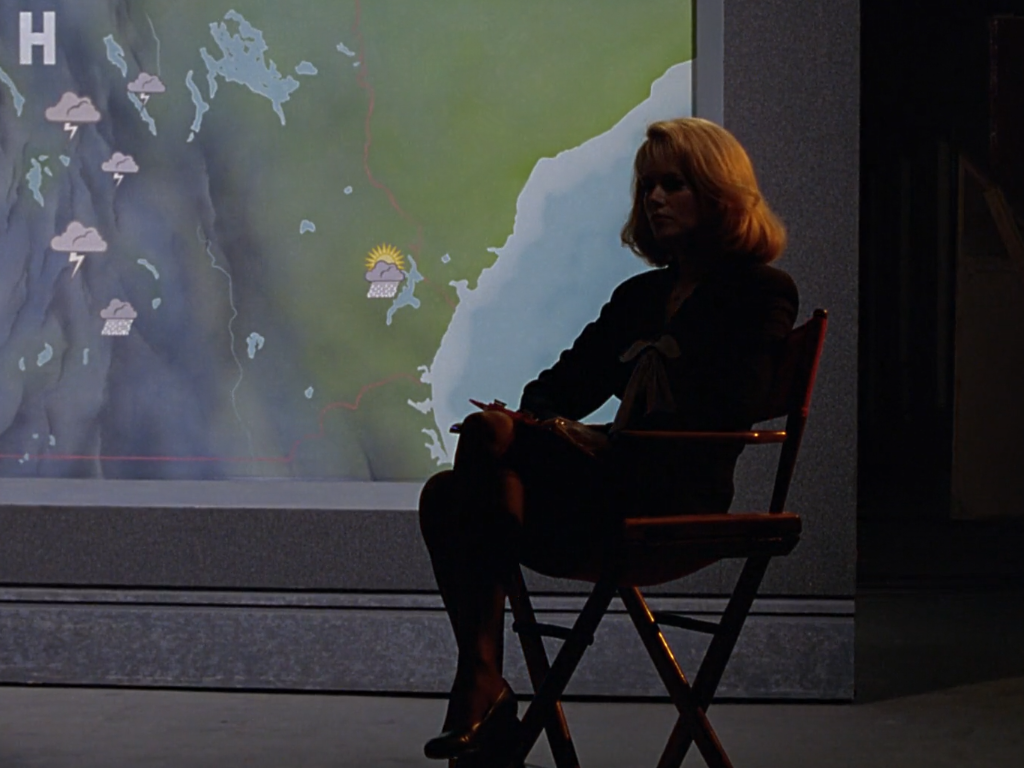
Nicole Kidman plays Suzanne Stone in Gus Van Sant’s comeback film after Even Cowgirls Get the Blues and first venture with a major Hollywood studio. Stone wants to be a television newscaster and is willing to do anything to get what she wants, for what is worthwile doing in life if it’s not visible on television, she asks.
Marie Colman: Vous vous amusez beaucoup avec les titres de journaux dans la séquence d'ouverture.
Gus Van Sant: C’est ma séquence préférée parce qu'on y lit le mot acte. Et c’est exactement le sujet du film, acte. Sexuel. Mais j’aime bien lire les journaux à scandale quand ça parle de sexe, par exemple Rutger Hauer qui s’habillerait en femme. Il y a des choses qu’on ne peut pas rater. La sexualité, c’est ce qui m’intéresse le plus parce que je suis gay, et en ce moment c’est un sujet très chaud; un peu comme dans Hair, on est entrés dans le cycle de l'Aquarius.
Marie Colman en conversation avec Gus Van Sant1
“In 1995, Suzanne’s pronouncement – ‘You’re not anybody in America unless you’re on TV’ – might have seemed unsophisticated instead of entirely prophetic. Mantras often do. Their spiel-like construction has a way of revealing a person’s inner rookie, and in Suzanne’s case, exposes her inclination towards formula-steered success. She comes off as someone sponsored, coin-operated like a sound bite dispenser. ‘On TV is where we learn about who we really are,’ she says. ‘Because what’s the point of doing anything worthwhile if nobody’s watching?’ It makes sense that Suzanne communicates in absolutes she’s heard, for instance, at a media conference in Florida where she woos a TV exec played by George Segal. When your parents believe you to be flawless, effectively eulogize you from birth, and when your boss treats you like a doll, and when your husband expects dinner, sex, babies, and when your small town of Little Hope, New Hampshire, is perfectly contented by its drowsy limits, it’s no wonder that the first person – be it a slimy media gatekeeper or a dumbstruck teen – to make you feel seen beyond who you are (for your wants, drive, long game) inspires quick indoctrination. Because regard isn’t solely a measure of attention given to someone: it requires detection. And that sort of antennaed reverence elicits from Suzanne, who is bored and in the mood to manipulate, a feeling of consequence. Influence, for her, is much the same as being televised, and playing to another’s person power, be it access or youth, is, she knows, one manner of extending her own. [...]
While satire often calls for dark comedy effected by one-note characters, Kidman’s rendering of Suzanne is, I’d venture, satirical, yes, but mostly: woman. She’s multitudes, instinct, intention, and body. She’s all those things and then, just as swiftly, none of those things. She’s a pair of shoulders pushed back the second the camera operator says, “You’re on!” She provokes not for the sake of it – or maybe, a little – but mainly out of obligation. Terrified of being ordinary, of its complaisance or worse, of a life on layaway, Suzanne will do whatever she can to avoid such a fate. As the film’s title suggests, the cost is of zero consequence. Until of course it is.”
Durga Chew-Bose2
“To Die For, ostensibly a crisp Hollywood product glazed with an indie/art patina, ends up, inadvertently or not, offering some of the ‘difficult’ pleasures of the literary movie; it starts to seem really good precisely for its relative ‘failures’ – thematic glitches, uncertainties of tone, abrupt shifts in emotional register, overall lack of cohesion. The conventional storytelling-cum-moralizing that drives the movie – is Suzanne Stone a bad woman, the übermovie asks rhetorically – is periodically but decisively undermined by the more perverse, socially unredeemable pleasures Van Sant actually depicts on screen. ‘I never gave a rat’s ass about the weather,’ jailbird James says early in the film. ‘That all changed after I met Mrs. Maretto [Ms. Stone]. Now I take it very seriously. Now, whenever it rains, or there’s thunder and lightning, or it snows, I have to jack off.’ This is very funny – satire, the übermovie whines – but the really funny thing is, the sex scenes are, mirabile dictu, actually sexy. ‘It was like living in a really great movie,’ Lydia explains, ‘except it was kind of X-rated because of all the sex stuff.’”
David Rimanelli3
- 1Marie Colman, «Le sujet, c'est l'acte sexuel, » Libération, 22 mai, 1995.
- 2Durga Chew-Bose, “Things That Ordinary People Wouldn’t Do: To Die For at 20,” Hazlitt, 3 December, 2015.
- 3David Rimanelli, "Gus Van Sant's To Die For," Art Forum, November 1995.

